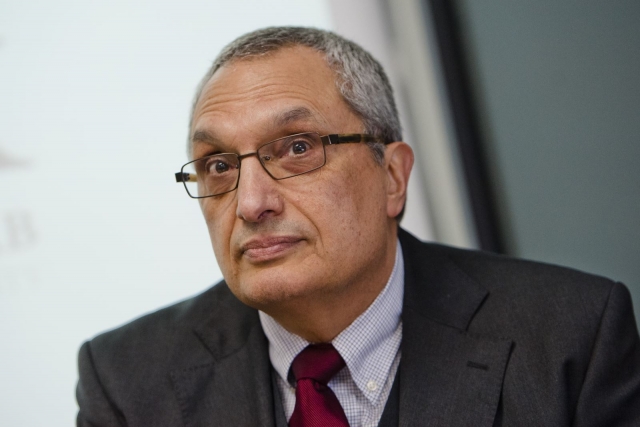Many members of Alexis Tsipras’s government enthusiastically suggest that Greece unilaterally decides to suspend the payment of its obligations to the creditors. Many media and ordinary citizens embrace the idea with even greater enthusiasm, as if a default holds the key to eternal prosperity. The Prime Minister himself is divided in terms of his desire to conclude an agreement with the creditors, but such that would not require him or his party to pay a political price. GRReporter sought the comment of Bulgaria’s former Prime Minister Ivan Kostov, who currently heads the Risk Management Lab at New Bulgarian University. Ivan Kostov answered the questions of Maria S. Topalova and Ivan Petkov.
In 1990 Andrey Lukanov's government unilaterally decided to suspend payments to the creditors of Bulgaria. What was the impact of that decision on the national economy?
 The impact of the default on the country's economy was catastrophic for the following reasons. It almost completely limited the access to necessary raw materials and working foreign currency loans, and led to a very severe economic recession as well as to printing money to finance the budget deficit, which in turn led to hyperinflation, along with acute shortages of essential goods at that time. This combination resulted in highly impoverished households.
The impact of the default on the country's economy was catastrophic for the following reasons. It almost completely limited the access to necessary raw materials and working foreign currency loans, and led to a very severe economic recession as well as to printing money to finance the budget deficit, which in turn led to hyperinflation, along with acute shortages of essential goods at that time. This combination resulted in highly impoverished households.
You took over the post of finance minister just after the fall of Lukanov’s government. In what state did you find the country's finances?
There was a high budget deficit and financing it with the usual tools was impossible. The foreign currency reserves were almost totally exhausted and all external creditors boycotted the country. It was impossible to reach an agreement with the international financial institutions due to the totally different accounting and statistics systems and the economic concepts used by both sides. In short, the effects on the national economy and finances were disastrous. At that time, Bulgaria was the only bankrupt Eastern European country. Only the Russian Federation followed our tragic path in 1998. The consequences of this bankruptcy are even now burdening the people and the economy. Bulgaria returned on the global market of sovereign debt 24 years later.
In 1997 you became Bulgaria’s Prime Minister and had to rule after the governing of Zhan Videnov. What was the difference in the Bulgarian economy in 1990 compared to that in 1997?
It became clear only two years after the agreement with the creditors that Bulgaria again could not pay. It was impossible to serve the poorly renegotiated debt that was slightly reduced with extremely high interest rates on Brady bonds, especially in terms of the apparently retrograde government of Videnov and the Bulgarian Socialist Party (BSP).
Bulgaria was paying with its last reserves, again facing bankruptcy, with exhausted reserves and a rapidly depreciating currency. All other symptoms recurred. The second full depreciation of savings after 1989 occurred, affecting mainly households. The international financial institutions were the only source of foreign currency and Bulgaria was forced to fulfil their ultimate requirements in order to save the national currency and avoid a second disaster within the course of seven years.
You have significant experience in negotiations with both private and public creditors, and with the International Monetary Fund. In your opinion, what is the most important thing in order for an indebted country to reach an agreement?
Most importantly, its political class should have will and be ready for self-sacrificing. Coming to agreement is impossible without total political self-renunciation. No nation will ever be able to understand and accept the sacrifices that should be made to save what can be saved. No politicians are more hated than those who have achieved and implemented these agreements. Let us remember the fate of Alexander Stamboliyski after signing the Peace Treaty of Neuilly and bringing the winners’ assignees to the Bulgarian National Bank and the Ministry of Finance.
You probably follow the crisis in Greece. How do you see its development in the coming months, and in the longer term?
The Risk Management Lab has published for its subscribers two reports on the Greek crisis. They contain projected scenarios of what would happen in the country. The first report focuses on two possible scenarios for the risks of the governing of SYRIZA and Independent Greeks - first, for Greece itself, then subsequently for the euro zone, the European Union, NATO and Bulgaria.
The baseline scenario forecasts the following series of events: the negotiations on the debt are successful, adopting 60% of the economic and financial policy of the previous government, failing to keep the generous pre-election social promises. The pursuit of the oligarchy will be an attempt for a replacement policy. There will be a loss of confidence. In the end, the scenario leads to intense social conflicts, another recession and early parliamentary elections.
The backup scenario has the following events: a failed attempt to reduce the debt, suspension of debt payment and confrontation with the European Union, the European Central Bank and the International Monetary Fund, rapprochement with Moscow in search of financial and political support, inability to finance all budget expenditures and a financial collapse, and introducing the drachma, which will lead to a national catastrophe.
The second report completes the first, presenting a third scenario in which the Greek crisis is expressed in the exacerbation of the economic and financial crisis.